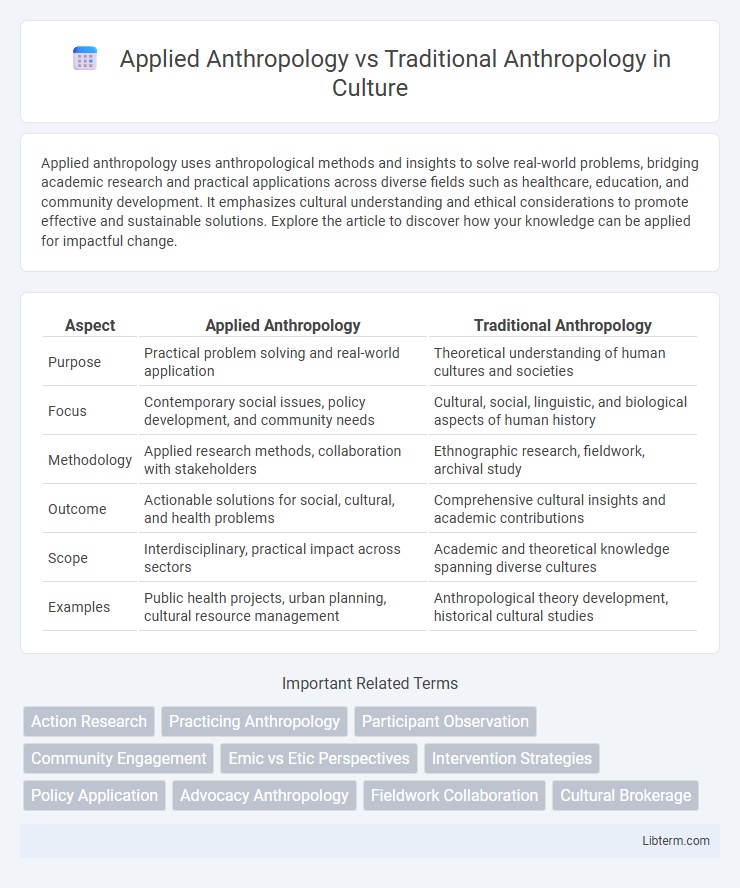Applied anthropology uses anthropological methods and insights to solve real-world problems, bridging academic research and practical applications across diverse fields such as healthcare, education, and community development. It emphasizes cultural understanding and ethical considerations to promote effective and sustainable solutions. Explore the article to discover how your knowledge can be applied for impactful change.
Table of Comparison
| Aspect | Applied Anthropology | Traditional Anthropology |
|---|---|---|
| Purpose | Practical problem solving and real-world application | Theoretical understanding of human cultures and societies |
| Focus | Contemporary social issues, policy development, and community needs | Cultural, social, linguistic, and biological aspects of human history |
| Methodology | Applied research methods, collaboration with stakeholders | Ethnographic research, fieldwork, archival study |
| Outcome | Actionable solutions for social, cultural, and health problems | Comprehensive cultural insights and academic contributions |
| Scope | Interdisciplinary, practical impact across sectors | Academic and theoretical knowledge spanning diverse cultures |
| Examples | Public health projects, urban planning, cultural resource management | Anthropological theory development, historical cultural studies |
Introduction to Applied and Traditional Anthropology
Applied Anthropology emphasizes the practical application of anthropological methods and theories to solve real-world problems in areas such as healthcare, education, and urban development. Traditional Anthropology primarily focuses on the theoretical study of human cultures, behaviors, and evolutionary history through ethnography, archaeology, linguistic analysis, and biological anthropology. Both branches share a common foundation in understanding human societies, but Applied Anthropology bridges academic research with tangible community and organizational outcomes.
Defining Traditional Anthropology
Traditional anthropology focuses on the comprehensive study of human cultures, societies, and biological aspects through long-term ethnographic fieldwork and theoretical analysis. It emphasizes understanding cultural practices, social structures, languages, and evolutionary history within a holistic framework. Research methods often include participant observation, ethnography, and comparative studies, aiming to document human diversity and cultural patterns.
Key Characteristics of Applied Anthropology
Applied Anthropology focuses on using anthropological methods and theories to solve real-world problems in areas such as healthcare, development, and education, emphasizing practical outcomes and community engagement. It involves interdisciplinary collaboration and adapts cultural insights to design effective interventions, contrasting with Traditional Anthropology's focus on academic research and theoretical knowledge. The key characteristics include problem-solving orientation, action-driven research, and direct application of ethnographic data to address societal issues.
Historical Evolution of Anthropological Approaches
Applied anthropology emerged in the early 20th century as a pragmatic extension of traditional anthropology, emphasizing direct problem-solving in real-world contexts such as public health, education, and development projects. Traditional anthropology, rooted in the 19th-century quest to understand human cultures through ethnographic research and theoretical frameworks, primarily focused on cultural documentation and historical reconstruction. The historical evolution reflects a shift from descriptive ethnography to interdisciplinary collaboration, integrating applied methods to address contemporary social issues while retaining theoretical grounding.
Methodological Differences
Applied Anthropology employs practical, problem-solving methods such as participatory action research and ethnographic fieldwork aimed at real-world outcomes, integrating interdisciplinary techniques from public health, education, and development sectors. Traditional Anthropology primarily relies on ethnography, longitudinal field studies, and comparative analysis to understand cultural, social, and biological aspects of human behavior without immediate intervention intentions. The methodological distinction centers on Applied Anthropology's use of collaborative, applied approaches versus Traditional Anthropology's emphasis on descriptive and theoretical frameworks.
Areas of Practice and Application
Applied anthropology emphasizes practical problem-solving in fields like public health, urban planning, and international development, where anthropologists collaborate with communities to design culturally appropriate interventions. Traditional anthropology primarily focuses on theoretical research in academic settings, studying human cultures, languages, and archaeological records to advance knowledge without immediate practical applications. The distinction lies in applied anthropology's direct engagement with real-world issues, while traditional anthropology concentrates on fundamental anthropological inquiry and scholarship.
Ethical Considerations in Both Fields
Applied anthropology emphasizes ethical considerations centered on collaboration with communities, ensuring informed consent, and prioritizing benefits for participants in practical interventions. Traditional anthropology upholds ethical standards through rigorous academic integrity, safeguarding cultural sensitivity and confidentiality during ethnographic research. Both fields are committed to respecting human rights, but applied anthropology integrates ethics directly into actionable solutions, while traditional anthropology focuses on ethical documentation and interpretation.
Impact on Society and Communities
Applied Anthropology directly addresses real-world problems by using ethnographic methods to develop practical solutions that improve health, education, and social policies within communities. Traditional Anthropology primarily focuses on theoretical research and cultural understanding, contributing to academic knowledge rather than immediate societal change. The impact of Applied Anthropology on society is often tangible and measurable, fostering community engagement and cultural preservation through targeted interventions.
Career Paths and Professional Opportunities
Applied anthropology offers diverse career paths in sectors such as public health, urban planning, and corporate consulting, emphasizing practical problem-solving and community engagement. Traditional anthropology primarily leads to academic roles, museum curation, and research positions focused on cultural, archaeological, linguistic, or biological studies. Professionals in applied anthropology often work with NGOs, government agencies, or private firms, whereas traditional anthropologists are more likely to pursue university teaching and scholarly publication opportunities.
Future Trends in Anthropological Practice
Applied anthropology increasingly integrates digital tools and collaborative methods to address real-world problems, emphasizing interdisciplinary approaches and community engagement. Traditional anthropology continues to provide vital ethnographic insights but is evolving through the adoption of virtual ethnography and AI-driven data analysis. Future trends highlight a convergence of both fields, leveraging technology and ethical partnerships to enhance cultural understanding and social impact globally.
Applied Anthropology Infographic

 libterm.com
libterm.com